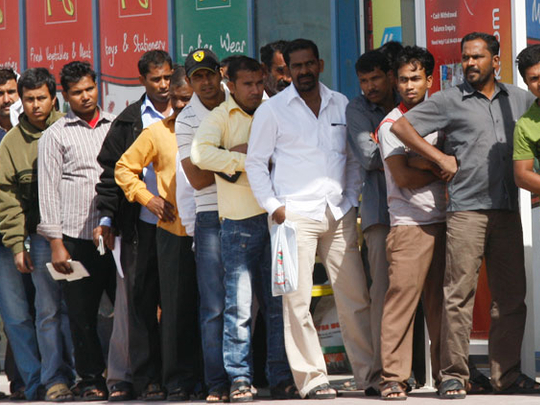
Abu Dhabi: As the two-month long amnesty for illegal workers ends on Monday, Bangladeshis constitute the largest group of people from Asian nations to take advantage of the pardon through their diplomatic missions, followed by Pakistanis and Indians.
The Ministry of Interior will release official figures on the total number of people who made use of the amnesty.
Asians nationals, mostly Indians, Pakistanis, Bangladeshis, Filipinos, Sri Lankans, Indonesians and Nepalese, comprise the majority of the workforce in the UAE; hence, most of the amnesty seekers are also from these communities.
As per the figures provided to Gulf News on Sunday by Asian embassies in Abu Dhabi, Bangladeshi missions in the UAE were expected to issue the largest number of emergency certificates (outpasses) by yesterday evening — more than 22,000. Pakistani and Indian missions had issued 5,465 and 3,300 outpasses respectively as of Thursday.
Amnesty seekers who are not in a position to produce their passports have to get the emergency certificates from their embassies or consulates to prove their nationality.
After applicants receive outpasses from their respective embassy or consulate, the UAE immigration authorities issue an exit permit that allows them to leave the country, provided they had entered the UAE on a valid visa.
Those amnesty seekers who have a passport can directly approach the UAE immigration authorities to get the exit permit. Between December 4 and January 4, about 20,000 illegal residents from 106 nations approached the immigration authorities and more than 9,400 of them have already left the country, the UAE Ministry of Interior announced on January 5.
The Bangladeshi embassy in Abu Dhabi issued about 4,700 out-passes and the Consulate in Dubai about 16,297 as of Thursday, said Mohammad Nazmul Quanine, Bangladesh’s ambassador to the UAE. “The total number would be more than 22,000,” he said. The number still doesn’t compare to the 40,500 Bangladeshis who took advantage of the pardon in 2007 through the embassy and the consulate, the envoy said.
Numbering over 700,000, Bangladeshis are the third largest expatriate community in the UAE.
The Pakistani embassy in Abu Dhabi had issued 5,465 emergency certificates as of Thursday evening, said Jamil Ahmad Khan, the Pakistani ambassador. About 25,000 Pakistanis in the UAE had availed themselves of the amnesty in 2007, Khan said. Totalling 1.2 million, Pakistanis constitute the second largest expatriate community in the UAE.
There were relatively fewer amnesty seekers from among the 2 million Indians who make for the largest expatriate workforce in the UAE. The Indian embassy in Abu Dhabi and the consulate in Dubai had issued 3,300 outpasses as of Thursday, said M.K. Lokesh, India’s ambassador to the UAE.
The Philippine embassy in Abu Dhabi has issued about 1,617 out-passes as of Thursday, said Grace Relucio Princessa, the Philippine ambassador to the UAE. The figures from the Philippine consulate in Dubai were not available. “But the number of applicants is very less this time, because many of the illegal Filipinos have already got jobs and regularised their status,” the envoy said. At around 600,000, Filipinos are the fourth largest expatriate community in the UAE.
The Sri Lankan consulate in Dubai had issued about 650 out-passes as of Sunday and most of the applicants were domestic workers, said M.M Abdul Rahim, the Sri Lankan consul general.
“We had urged all the illegal workers to take advantage of the amnesty. But the number of Sri Lankan illegal workers has gone down drastically,” Abdul Rahim said. The consulate had issued about 3,000 outpasses during the 2007 amnesty, he said. The figures from the Sri Lankan embassy in the capital were not available.
The Indonesian missions were not expecting more than 2,000 applicants by the end of the amnesty.
The Indonesian embassy in the capital had issued about 850 out-passes early last week and the number was unlikely to cross 1,000 by the end of the deadline, Salman Al Farisi, Indonesia’s ambassador said. The trend was similar to the previous amnesty, he said.
The Indonesian consulate received less than a third of the applications as compared to the previous amnesty. “We issued about 650 outpasses early last week, the number will not cross 1,000 by the end. During the 2007 amnesty, the consulate had issued about 3,000 out-passes,” said Heru Sudradjat, the Indonesian consul general.
The Nepalese embassy, which looks after its workers needs across the UAE, had issued 130 outpasses as of Sunday, said Deepak Adhikari, deputy head of the mission. He said the figure was not much different during the previous amnesty.







